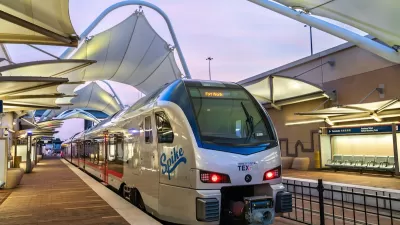An editorial calls for a comprehensive plan to address Dallas' growing need to overhaul its streetlights—80 percent of which are now older than their recommended 25-year life span.
The Dallas News builds suspense in introducing the pressing need to update the city of Dallas' traffic lights: "Few line items rate higher in a city budget than public safety, generally thought of as police and fire services. Dallas is no different, devoting most of its annual spending to this critical area....If 80 percent of the city’s police cruisers had exceeded mileage maximums, would we consider that a crisis? What if 80 percent of our firetrucks were past their useful life spans? Would the logical response be to avert our eyes and hope no one gets hurt?"
"So imagine your surprise to learn that 80 percent of Dallas’ 1,500 traffic signals blink on today past their recommended 25-year life spans. The city replaces them as they fail or are damaged by weather or accident, but that’s about it. Dallas has never had a comprehensive replacement program."
"Dallas’ streets department has been raising the alarm since last fall that this is not a good long-term plan, which doesn’t seem too revolutionary. It believes the City Council would be smart to find the money to replace about 60 signals per year. The problem, of course, is that this would cost about $250 million over 25 years."
The editorial's main argument is for a comprehensive plan to address the problem: "The council should consider whether stoplight hardware is an item to consider for its next bond program, as significant an infrastructure need as street repairs or new sewers."
FULL STORY: Editorial: Why Dallas’ outdated traffic signals are such a problem

Maui's Vacation Rental Debate Turns Ugly
Verbal attacks, misinformation campaigns and fistfights plague a high-stakes debate to convert thousands of vacation rentals into long-term housing.

Planetizen Federal Action Tracker
A weekly monitor of how Trump’s orders and actions are impacting planners and planning in America.

In Urban Planning, AI Prompting Could be the New Design Thinking
Creativity has long been key to great urban design. What if we see AI as our new creative partner?

King County Supportive Housing Program Offers Hope for Unhoused Residents
The county is taking a ‘Housing First’ approach that prioritizes getting people into housing, then offering wraparound supportive services.

Researchers Use AI to Get Clearer Picture of US Housing
Analysts are using artificial intelligence to supercharge their research by allowing them to comb through data faster. Though these AI tools can be error prone, they save time and housing researchers are optimistic about the future.

Making Shared Micromobility More Inclusive
Cities and shared mobility system operators can do more to include people with disabilities in planning and operations, per a new report.
Urban Design for Planners 1: Software Tools
This six-course series explores essential urban design concepts using open source software and equips planners with the tools they need to participate fully in the urban design process.
Planning for Universal Design
Learn the tools for implementing Universal Design in planning regulations.
planning NEXT
Appalachian Highlands Housing Partners
Mpact (founded as Rail~Volution)
City of Camden Redevelopment Agency
City of Astoria
City of Portland
City of Laramie





























